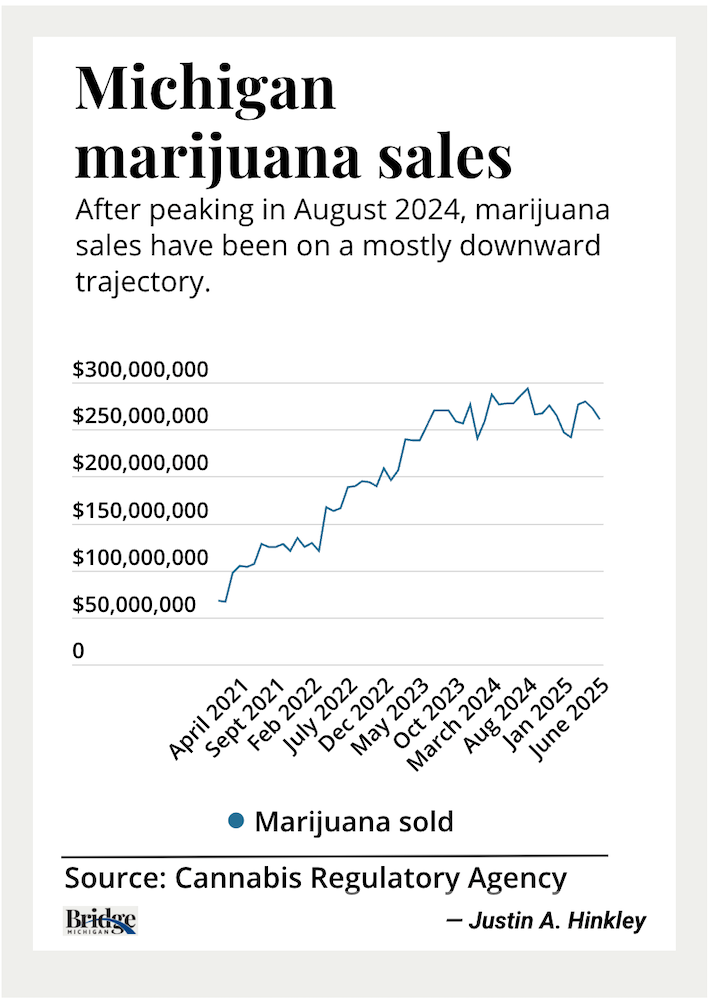Added on July 21, 2025
Sara Swanson
by Justin A. Hinkley (Bridge Michigan)
After years of growth, marijuana sales are slowing and prices are dropping in Michigan, choked by increasing competition and oversupply.
Last month, Toronto-based cannabis company TerrAscend announced it would completely exit the Michigan market, closing 20 retail stores and four cultivation facilities.
The company’s executive chairperson in a statement called Michigan “an extremely difficult market.”
Michigan doesn’t cap the number of dispensaries allowed in the state and communities that have tried to do so have faced lawsuits. Seventy-five of Michigan’s 83 counties now count at least one marijuana business, and there are now more than 850 such businesses statewide.
Even though sales decreased 4.2% in June statewide, farmers are planting more marijuana. In June, the industry added 470,000 plants, up to 3.2 million, according to state reports.
The industry is approaching a “saturation point where new dispensaries that start are cutting into the business of other dispensaries,” said Nathan Joyal, who studies and teaches about cannabis issues at Northern Michigan University. “I think that phenomenon is what has driven the price down and driven the competition up. I guess I would say it’s saturated.”
The average retail price for a cannabis flower — by far the most popular marijuana product sold — plummeted from more than $200 an ounce in June 2021 to about $63 an ounce last month, a 70% drop that has gutted some dispensaries’ business, according to the state.
After skyrocketing every month for at least the last five years, monthly recreational marijuana sales in Michigan peaked at $294.2 million in August 2024, according to monthly reports from the state’s Cannabis Regulatory Agency.
Sales have mostly fallen each month since then, coming in at $260.6 million — an 11% dip from the peak — last month. Last June, dispensaries sold $277.4 million in cannabis products.
Meanwhile, Michigan received another 76 applications from people wanting to launch marijuana businesses.
In Michigan, dispensaries are especially clustered along the borders of Indiana and Wisconsin, two states where marijuana remains illegal. Iron, Gogebic and Menominee counties along the Wisconsin state line and Branch and St. Joseph counties alongside Indiana each have more than three dispensaries per 10,000 people. Wayne County, by comparison, has 0.49.
 This article is being republished through a syndication agreement with Bridge Michigan. Bridge Michigan is Michigan’s largest nonprofit news service and one of the nation’s leading and largest nonprofit civic news providers. Their coverage is nonpartisan, fact-based, and data-driven. Find them online at https://www.bridgemi.com/.
This article is being republished through a syndication agreement with Bridge Michigan. Bridge Michigan is Michigan’s largest nonprofit news service and one of the nation’s leading and largest nonprofit civic news providers. Their coverage is nonpartisan, fact-based, and data-driven. Find them online at https://www.bridgemi.com/.

Source link Strains of cannabis are seen at Craft Leaf, a cannabis retailer in Coldwater. Photo credit: Josh Boland/Bridge Michigan.
 This article is being republished through a syndication agreement with Bridge Michigan. Bridge Michigan is Michigan’s largest nonprofit news service and one of the nation’s leading and largest nonprofit civic news providers. Their coverage is nonpartisan, fact-based, and data-driven. Find them online at https://www.bridgemi.com/.
This article is being republished through a syndication agreement with Bridge Michigan. Bridge Michigan is Michigan’s largest nonprofit news service and one of the nation’s leading and largest nonprofit civic news providers. Their coverage is nonpartisan, fact-based, and data-driven. Find them online at https://www.bridgemi.com/.
Like this:
Like Loading…
by Sara Swanson
Sara Swanson is an editor, writer and founder of the Manchester Mirror.














